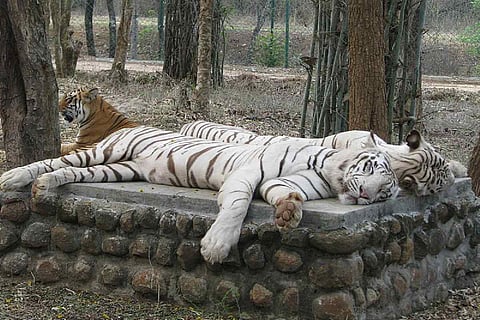To protect animals from COVID-19, Karnataka zoos have a ‘minimum contact’ policy
Over the last few days, there have been some reports of animals testing positive for the novel coronavirus in the US. These include eight big cats – five Malayan tigers and three African lions – at Bronx Zoo, and two pet cats. In the former case, the big cats are believed to have contracted the virus from an asymptomatic caretaker at the zoo. However, even more such cases made the news, the Zoo Authority of Karnataka (ZAK) had already put measures in place to safeguard the animals in its zoos.
ZAK authorities assert that ‘social distancing’ between captive animals and the staff caring for them is an integral part of zoological management in India. Even before lockdown came into effect in the country on March 24, ZAK had announced no entry for visitors since March 15 across the zoos so as to prevent potential transmission of the disease from humans to wild animals in captivity.
Additional Principal Chief Conservator of Forests (APCCF) and Member Secretary of ZAK, BP Ravi said that ZAK had acted after the news had emerged of a pet dog in Hong Kong testing positive for COVID-19 in March. “Zoos were put on alert; and based on a veterinarian conference on virology – we shared research papers on protocols to be followed by the zoo staff in handling the animals in a pandemic situation,” Ravi said.
ZAK has as many as 5,247 animals with 2,825 mammals, 1,703 birds and 719 reptiles. Among the big cats vulnerable to COVID-19 are 23 tigers, 22 lions and 36 leopards at Bannerghatta Biological Park in Bengaluru; 14 tigers, three lions and 24 leopards in Mysuru Zoo; five tigers, four lions and eight leopards at the zoo in Hampi, Ballari; seven tigers, four lions and 18 leopards at Shivamogga Zoo; and a pair of tigers and six leopards at Gadag Zoo.
Unlike in India, zoos in some other countries encourage petting and conditioning training for the animals, resulting in close proximity between humans and animals, said Executive Director of Sri Chamarajendra Zoological Gardens, Mysuru, Ajith Kulkarni .This close proximity interaction creates scope for any disease to easily transmit from human to animals or vice-versa.
“However, captive animals in India find themselves relatively safe, as zookeepers are trained only to maintain minimum contact. As far as visitors are concerned, there is absolutely no scope of them reaching out to the animals,” Ajith said. The minimum contact policy reduces the risk of spread of virus, he added.
Ajith cited the instance of an ailing tiger’s death in India due to a ‘respiratory illness’ in early April in Pench Tiger Reserve, which lies in Madhya Pradesh and Maharashtra, and how it made the Central Zoo Authority of India advise caution to protect the big cats from COVID-19.
“Following the death of the tiger, the Central Zoo Authority of India (CZA) and National Tiger Conservation Authority directed zoos across the country to monitor the health of animals in captivity on ‘highest alert’,” he said.
According to Ajith, the personnel, especially at Mysuru Zoo have had experience of handling the spread of H1N1 virus in 2017, and officers and staff were aware of the protocol to be followed to contain COVID-19 transmission. “Though H1N1 and SARS-CoV-2 are different viruses, staff had sufficient knowledge on the precautionary measures to be initiated for a viral disease,” Ravi added.
In case a tiger tests positive for COVID-19, the zoo officials said that the immunity boosters for animals, supporting medicines are readily available to handle the situation. A close observation of animals in captivity has been maintained by staff through CCTVs where zookeepers, supervisors and veterinarians are on the constant lookout for any symptoms in animals’ health conditions.
Even quarantine facilities are available at zoos. “Care has also been taken in food distribution at zoos. Food supply vehicles are sanitized every day, while beef, eggs, grains and other feeds for animals are certified by zoo vets. Dressed beef is washed with hot water before being given to animals,” Ravi added.
Speaking on the staff management, Ravi said that the staffers coming from containment zones have been asked not to enter the general premise at the zoos. General staff at zoos are screened at the entrance gate. Staff has also been asked to maintain personal hygiene, wear face masks, use hand sanitizers, and maintain social distance during their routine interactions while tending duties.
A veterinarian at a zoo said that the lockdown has been a blessing in disguise for the captive animals – they have been less stressed without visitors coming. “Even an animal that is said to behave abnormally in captivity otherwise, will behave normally without disturbance from visitors,” he observed.
(Story by Story Infinity (Subs and Scribes Media Ventures LLP.)

